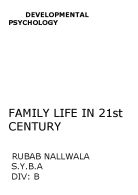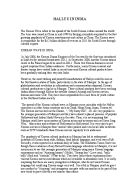STATUS OF CHILDREN IN JOINT FAMILY SYSTEM
A joint family involves much more than people living under the same roof. Joint families are like the first training grounds, where a child learns interpersonal skills. Children in joint families learn lessons of patience, tolerance, cooperation and adjustment.They learn to share more easily, learn to co-operate and adjust under practically every circumstance. When a child lives with his/her grandparents and other older members of the family from the time he/she is born, they grow up appreciating, admiring and loving them. In a joint family a child learns and is reared by a number of people, thus dividing work, saving time and creating a spectrum of exposure and awareness. And for working parents, it’s a blessing to have reliable, trustworthy caretakers for your child, isn’t it? After all, who better than to impart the same values that you have imbibed than the grandparents? Joint family can also be a source of inspiration as there are many role models and members for supporting during times of stress and difficulty. Children develop strong ties with all their siblings as well as uncles , aunts and grand-parents. It also gives better financial , emotional and social stability.
In a joint family with more than one child, there is bound to be constant comparison, something that could lead to the development of unhealthy competition and feelings of envy. There is also a tendency for joint families to be autocratic in nature and the head of the family, lays down the law in the household. While it may work in some scenarios, it can also be the cause of a lot of friction. Younger members of the household can feel their self-identity being inhibited and often struggle with a constant conflict between their conservative orientation and their exposure through their other social interactions. Joint families can also pose a larger resistance to change as the opinions on any matter are more than one. Even due to traditional and orthodox thinking of the elderly members in the family wrong ideas of religious communities, caste, religion can also crop up. Due to the need and demand for a male child and gender roles there can be early exposure to wrong methods and perspectives about the female members and leading to faulty socialization.
STATUS OF CHILDREN IN NUCLEAR FAMILY SYSTEM
Most parents want to bring up their children with their own set of values and principles, without any “interference”. This is something that can be easily established in a nuclear family, wherein there is more space for individuality and self-expression in a nuclear family set-up. Nuclear families make the child more self reliant and decisive as he/she is not as interdependent on a large number of family members to make decisions and take action. This independent streak can come in handy, as the child grows into an adult and has to make many decisions himself/herself. Communication channels between the child and parent can also be more open and transparent, in a nuclear family, as parents have their attention focused on their child, without having to divide their time with too many household responsibilities and between other members of the household.
While nuclear families seem to work for today’s generation in a lot of ways, there are challenges that parents face while raising their child in this set – up. If both parents are working, one may have to leave their children alone with caretakers for given lengths of time. This can mean children being brought up by care centers or domestic help, who may not be as attentive or reliable as family members. Parents may also have to deal with attention-related problems which are usually by-products of nuclear family systems, where the child, finding both parents absent and no one else from the family, usually resorts to attention seeking behavior. Being sad, insolent, and reclusive among other things .Children raised in nuclear families also tend to be less tolerant and more impatient, as they are not accustomed to dealing with too many people with varied personalities from an early age, and living in a nuclear family does not demand a great deal of flexibility of them. Children from nuclear family struggle to adapt themselves to different situations, especially when they have relatives visiting them. The child has to follow only one set of rules, and is not confused with varying opinions.
THE CHANGING PHASE OF CHILD CARE
A great change is occurring in the way in which children are being brought up in the world’s economically advanced countries. After centuries of being a predominantly private, family affair, the care of very young children is now becoming, in significant degree, an out-of-home activity in which
governments and private enterprise are increasingly involved.
The dynamics of the workforce have changed radically in recent years, to the extent that traditional childcare no longer suits many families. The ways we work have changed so much and childcare simply hasn’t kept up. As a result, many parents have abandoned traditional childcare. Child care is evolving, and most care providers and parents agree the changes are for the best.
No longer is child care for young children simply babysitting. Child care centers have mostly transitioned to centers for early education, where young tots are involved with early learning. It's no surprise that drop-in child care is on the grow. What may come as a surprise to some is that these facilities typically offer high-quality, safe, and affordable care options. Corporate child care is also raising the bar in terms of quality child care. An increasing number of companies are either offering (or considering) in-house child care centers as a perk for attracting and retaining top employees. In addition, more companies are partnering with child care centers to offer discounted rates or even special hours for employees. An increasing number of facilities offer parents the peace of mind of being able to check on their child while at daycare as desired through video streaming of classroom activities throughout the day. Other providers regularly take photos of children and send to parents, post daily or weekly blogs or e-newsletters online for parents to view, or even exchange emails or text messages throughout the day. The technology provides parents and providers with another tool for staying "in touch" and bonding with activities and events planned for youngsters.
Some families may use a nanny for an infant, an in-home provider for a toddler, and then switch to a care center for a preschooler. Some families use one type of care during the school year and then another for summer months. Occasional care service options can include babysitters, drop-in care, specified parent night out nights, and even child care co-ops.
DIVORCE, SEPRATION AND CHILDREN
When parents decide to divorce or separate, their child or children are faced with multiple stressors. Just knowing that things are going to be different after a divorce, but not knowing exactly how can be frightening for most children. Children from divorced families have to learn to cope with the many changes in their family. The amount of contact with one parent, often their father, will be reduced. Children may have to move from their family home or change schools. They may have a decreased standard of living. They may have to live in two homes. They may have more responsibility placed on them. The custodial parent may be physically and psychologically less available for children due to increased demands. Often, children initially focus on these immediate negative effects of the family breaking up, and do not find comfort in knowing that other families that have divorced eventually do okay.
Adjustment to divorce can take up to two years or even longer. Many children will adjust to their parents' divorce, but some will continue to have significant problems into adulthood. Parents' sensitivity to their child's needs is one of the most important factors in facilitating adjustment. Other factors such as the child's age, gender and temperament will also influence how well the child adjusts. A preschooler's reaction to and ability to understand their parents' divorce will be very different from that of an adolescent. A child's beliefs about divorce will change over time due to their cognitive maturity and evolving relationships with their parents. Awareness and sensitivity to the developmental differences in children's reaction to divorce can provide parents with insight in how to talk to their children to help in their adjustment. Because of their limited cognitive abilities, preschoolers are often baffled by their parents divorce. They lack the coping skills necessary to deal with all the changes associated with divorce, which place them at risk of having more adjustment problems than an older child. Children tend to be egocentric at this age, and will often blame themselves for the divorce. They may feel that it is their responsibility to bring their parents back together.
Preschoolers tend to be "emotionally needy," have fears related to abandonment, and may display acting-out behaviors following their parents' divorce or separation. Preschooler are likely to become very distressed during visit exchanges. Although children between the ages of about 6 to 8 continue to have fantasies about reconciling their parents, they are less likely to blame themselves for the divorce. Children at this age have been found to experience intense grief over the loss of not having one of their parents living with them. The older child (ages 9 to 12) is better able to understand their parents' divorce. They are likely to consciously express their disapproval and tend to take the side of one of their parents. Anger at their parents is conscious.
Adolescents' ability to understand and conceptualize their parents divorce will enhance their adjustment. However, they are faced with the task of integrating the divorce experience with their own developing identities. Boys and girls tend to react differently to their parents' divorce. As a rule, girls tend to become anxious and withdrawn, while boys tend to become more aggressive and disobedient. Girls from divorced families may become sexually active earlier than girls from intact families. Interestingly, boys often adjust better when their mothers remarry, while girls have more difficulty.
Children of divorced families tend to have long-term adjustment difficulties when there is ongoing conflict between their parents. Boys, in particular, are likely to display marked behavior problems when this exists. Children's adjustment is also determined by the amount of conflict the parents had before the divorce. Unfortunately a practical change that often happens with divorce is a reduce in standard of living. This may cause the custodial parent to be overwhelmed, and unable to meet the needs of the child.
Counseling is an excellent resource for divorced/separating couples. A trained and licensed therapist can provide an objective viewpoint and can synthesize the dysfunctions in the relationship. Children will recall how much they felt loved if one or both parents sought advice from an expert. Being ascertain that the therapist is trained in marriage and family therapy, makes certain that goals that are in the children's best interest are attained. The message that children are first is the greatest healing for their hearts and will help in proper personality formation and elimination of stressors.








